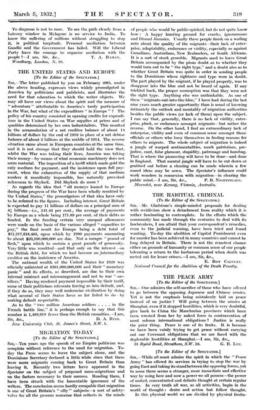THE UNITED STATES AND EUROPE
.[To the Editor of the SPECTATOR.] The letter published by you on February- 20th, under the above heading, expresses views widely promulgated in America by politicians and publicists, and illustrates the need for that education to which the writer objects. We may all have our views about the spirit and the measure of ." adventure " attributable to America's tardy participation in the War, but what of the expenditure" in Europe " ? The policy of his country consisted in opening credits for expendi- ture in the United States on War supplies at prices and of qualities determined by her own industrialists. This resulted in the accumulation of a net creditor balance of about It billions of dollars by the end of 1919 in•place of a net debtor balance of about 3 billions at the middle of 1914. The reverse situation came about in European countries at the same time, and it is not strange that they should hold the view that, whilst the War was taking their lives, America was taking their money—by means of what economic machinery does not 'seem material. The imposition of a tariff which made gold the only medium for Payment, and the insistence upon full pay- ment, when the exhaustion of the supply of that medium renders it manifestly impossible, has naturally provoked 'references to Shyleck. Did Shylock do more ?
As regards the idea that "all moneys loaned to Europe 'during the progress of the War have been wholly remitted by the United States," the promulgators of that idea have only to be referred tO the figures. Including interest, Great Britain ' is expected to pay 11 billions of dollars on a principal sum of 41 billions—i.e., 241.43 per cent., the average of payments 'by Europe as a whole being 171.89 per cent, of their debts as funded. In the funding certain very unequal allowances were made on the basis of the various alleged "capacities to pay," the final result for Europe being a debt total of $11,217,618,483, upon which by 1990 payments amounting to about $20,100,000,000 arc due. Not a meagre "pound of flesh," upon which to sustain a great parade of generosity. Very-little Was remitted—and that only on the interest —on the British debt, for which we had become an :intermediary creditor on the insistence of America. .
The national wealth of the United States for 1920 was officially estimated at 8301,000,000,000 and their "monetary panic" and its effects, as described, are due to their own :internal mistrust and mismanagement and not to war " sac- rifices." Having rendered payment impossible by their tariff, some of their politicians advocate forcing us into default, and, g they do so, they may well undermine civilization by doing yvhat • several of their States have so far failed to do—by making default respectable.
. As to the "two million American soldiers . . . . in the French battle line," it is perhaps enough to say that this number, is, L489,919 fewer than the British casualties.—! am, • New University Club, St. James's Street, S.W.1.,


















































 Previous page
Previous page